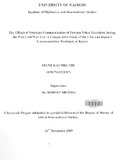| dc.contributor.author | Kaumbuthu, Irene | |
| dc.date.accessioned | 2012-11-13T12:35:41Z | |
| dc.date.available | 2012-11-13T12:35:41Z | |
| dc.date.issued | 2009 | |
| dc.identifier.uri | http://erepository.uonbi.ac.ke:8080/handle/123456789/5166 | |
| dc.description.abstract | This research project is a comparative study of how the United States Government and the Japanese Government through their diplomatic missions in Kenya conduct strategic communication of foreign policy execution in the post cold war Kenya. The research analyzes this using a flexible and responsive methodological framework that was developed by Julia Coffman of Harvard Family Research Project for conducting strategic communication assessments on organizations.
The study utilized both primary data and secondary data. In order to evaluate Japan's and US foreign policy strategic communication in Kenya and found out how the two compared. A Semi structured interview method was used to conduct the research since it was considered a fairly open framework which allowed for focused, conversational, two-way communication.
The findings brought to the fore that current strategic communication practices in the world today are based on outdated message influence models. To succeed in this environment communicators should deemphasize control and embrace complexity, replace repetition of messages with experimental variation. It also became clear that strategic communication and public diplomacy are not clearly defined and it is not apparent if one is a subset of the other or whether the two are one and the same thing.The vast majority of the documents reviewed and interviews conducted in this study indicated that effective coordination of strategic communication would require further organizational change.
The number of countries exploring strategic communication of foreign policy making and execution will continue to grow due to the new stage that the evolution of diplomacy finds itself in. The practitioners of strategic communication of foreign policy therefore have to make good preparations for the changed realities of the profession and students of international relations would benefit more by embracing this new approach to foreign policy
communication. | en_US |
| dc.language.iso | en_US | en_US |
| dc.publisher | University of Nairobi, Kenya | en_US |
| dc.title | The effects of strategic communication of foreign policy execution during the post cold war era: a comparative study of the USA and Japan's communication strategies in Kenya | en_US |
| dc.title.alternative | Thesis (MA) | en_US |
| dc.type | Thesis | en_US |

